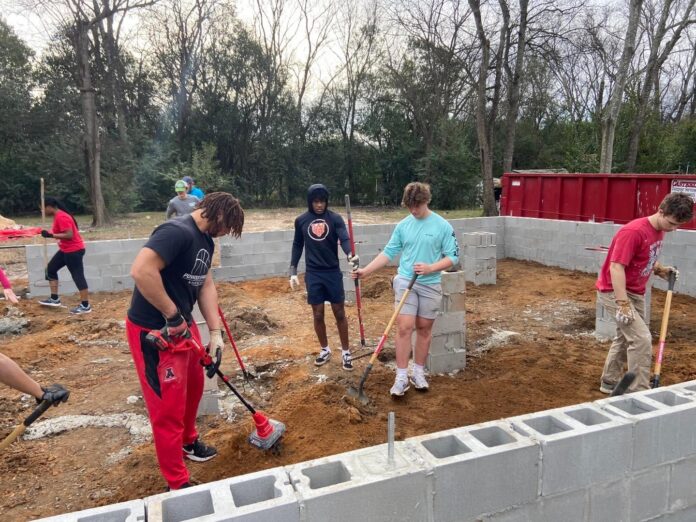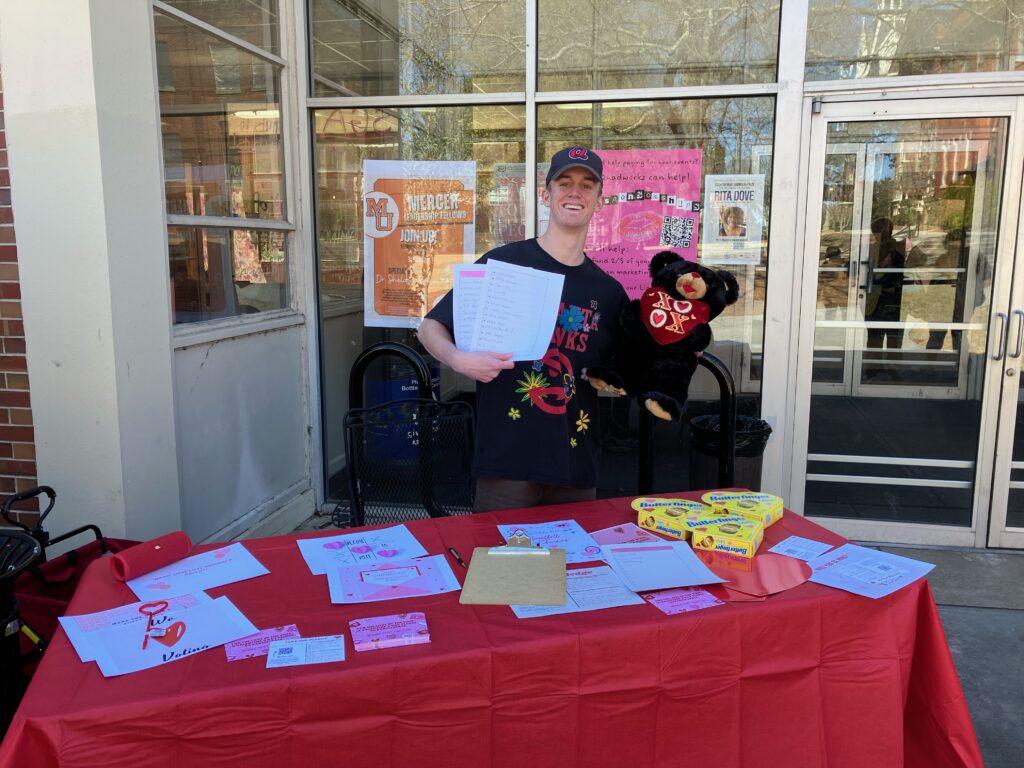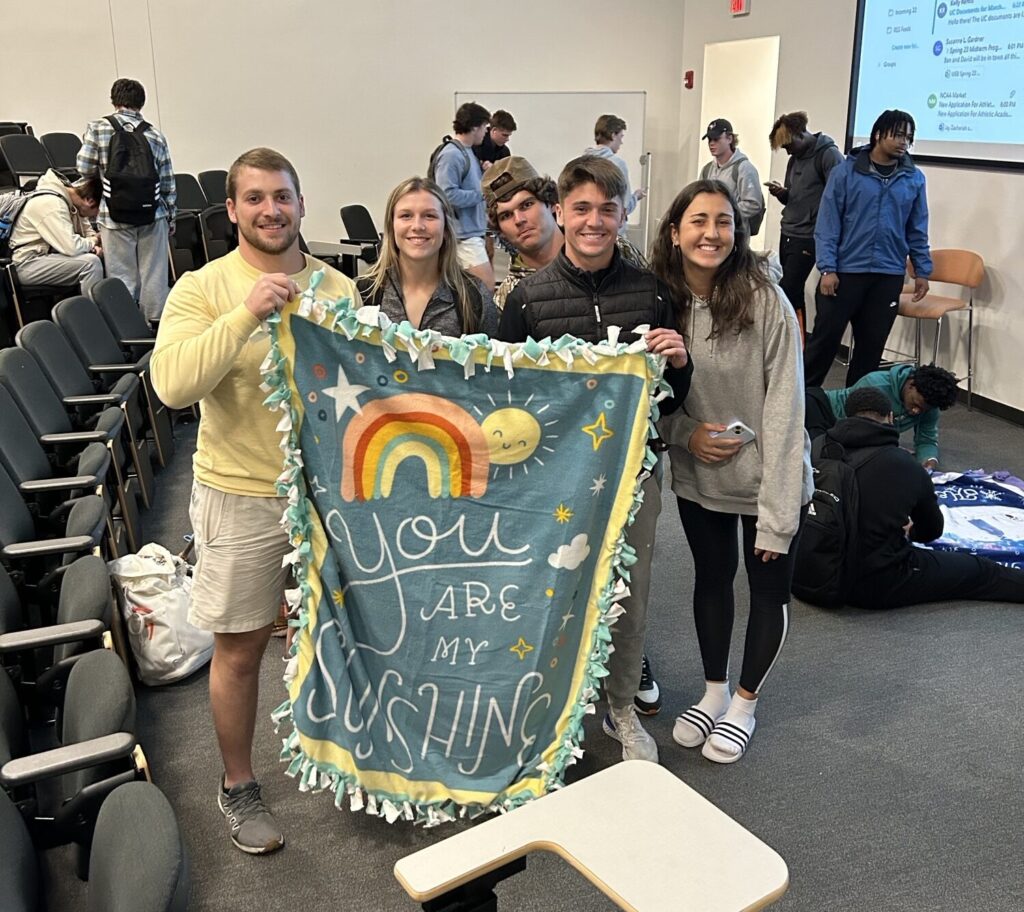
A unique pair of courses has been helping Mercer University student-athletes better adjust to college life and connect with the community.
The University created two life skills classes in the early 2000s and added a service-learning component in 2016, said Delaney Ryan, director of student-athlete support services. All first-year student-athletes are required to take these two courses, with 120-140 students typically in each course. Transfer students sometimes take the second course to fulfill their service-learning requirements.
The fall semester course focuses on the transition to college and being a student-athlete. It covers topics such as time management, study skills, mental health, communicating effectively with professors, eligibility and compliance, and name, image and likeness rules.
Student-athletes face their own unique set of challenges, and the class helps them learn how to effectively juggle their responsibilities, said Lauren Shinholster, associate director of engaged learning.
“I learned how to deal with athlete life as well as academic life and how to get through it and learn different life skills and ways that we can deal with it. It’s super busy being an athlete,” said freshman Fiona Tanis, a women’s lacrosse team member, who hasn’t yet decided on a major.
Sophomore Kaleb Frost, an elementary education major on the football team, said he struggled with time management and procrastination in high school. The life skills course helped him figure out how to schedule his time and when to say yes and no to activities.
Junior Ashlee Locke, a member of the women’s basketball team and a double-major in kinesiology and sociology, said the course helped her excel both in the classroom and on the court.
“Coming into it as a freshman, I think the class really helped us understand how to find a balance between athletics and school, as well as having a social life, and that’s a key part of being in school,” she said. “You have to have well-rounded boundaries for yourself.”
The spring semester class focuses on the student-athlete’s image and making community connections. Before the service-learning aspect was added to this course, students often had a hard time fulfilling their experiential learning requirement due to practice and game commitments. Now, they can choose between one of three or four opportunities that have been curated to accommodate their busy schedules, Ryan said.
One option is to tutor students in local schools for the United Way’s Read 2 Succeed program. Frost tutored second graders at L.H. Williams Elementary, and Tanis is currently working with first graders at Hartley Elementary. Tanis said she has loved helping the kids improve their skills. The experience has also shown her more of the Macon community and strengthened her communication and collaboration skills.
“I enjoy working with kids in general. It was very satisfying to see their progress in reading,” said Frost, who plans to continue to give back to Macon and his hometown of Charleston, South Carolina. “It really showed me that community service is important, and it’s something that everybody should do. I want to give back to the people who’ve helped me. I want to give back to the places that helped me become who I am today.”

This semester, student-athletes also had the option to assist Mercer Votes in its outreach efforts or work with one of the program’s “Bears in the Community” partners, which include Brookdale Resource Center, animal shelters and Backpack Buddies, Shinholster said.
In the past, students have done projects for the Atrium Health Levine Children’s Beverly Knight Olson Children’s Hospital in Macon, including making blankets for pediatric patients. When hospital visitation was restricted due to the COVID-19 pandemic, some students recorded read-aloud videos of books for pediatric patients to watch and assembled activity kits with games and crafts that were distributed to them.
“It allows our students to have opportunities to go out into the community to give back. They all have such a big platform as student-athletes here at Mercer,” Ryan said.
Locke volunteered at Brookdale, a transitional housing and resource center for people experiencing homelessness, where she served meals and helped with other tasks. She enjoyed talking with the residents about basketball and seeing the joy that brought them. She returned to volunteer after her class ended.
“I want to go into the health care field, so having that community service type of mindset and the willingness to help people, not just because you have to, it really does help,” she said. “Just being able to get off campus and meet the people who have welcomed you into the community as an athlete, it shows you the light you can bring into people’s lives.”
Students must devote at least 10 hours to the project they choose, in addition to time required for training and reflection, Shinholster said. Ryan said the service experience helps students learn to be leaders, and they’re excited to visit community sites each week. Many of the students choose to continue their volunteer work even after they complete the course, Ryan said.
“You see those light bulb moments that happen for them,” Shinholster said. “So much of that is getting out of their own bubble and interacting with other peers that are not athletes. Having that opportunity to engage with that broader community is something we have found beneficial for athletes and other people they’re interacting with.”
The NCAA mandates that institutions teach life skills topics to their athletes in some way, but Mercer’s class platform is a unique approach. Ryan and Shinholster discovered this while attending the 2023 Gulf-South Summit, during which they won the student impact award for their poster about the program. Faculty and staff from other colleges approached them for more details on how they implemented their life skills courses.
Earlier this semester, the pair presented their program as a model for other institutions to use during the 2024 Gulf-South Summit and Compact2024 Conference.
“We’re receiving national and regional recognition for this work,” Shinholster said.
Ryan said she hopes the life skills program will continue to benefit Mercer student-athletes and that it can be expanded upon in the future.










